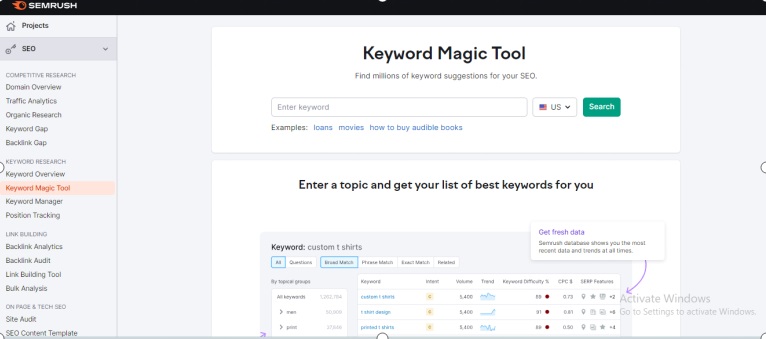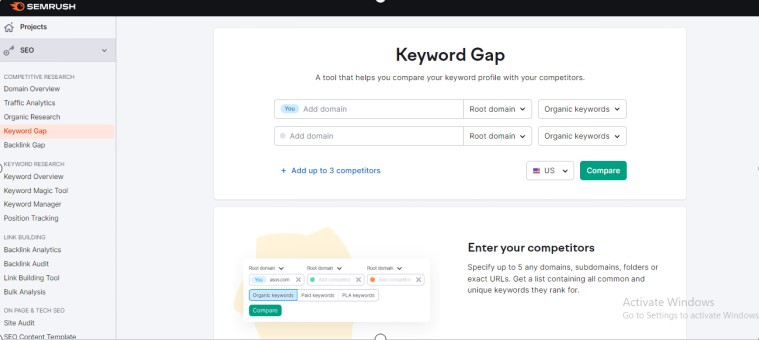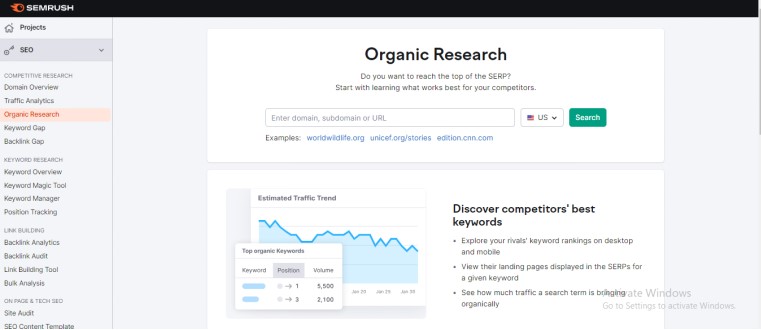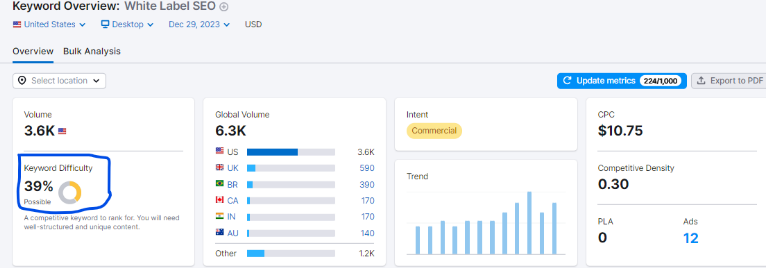Advanced Keyword research SemRush
In the dynamic landscape of online content, mastering the art of keyword research is pivotal for anyone aiming to enhance their digital presence. The process has evolved, and advanced tools like SEMRush have become indispensable for SEO professionals and content creators alike.
Understanding SEMRush
Semrush is a powerful tool for advanced keyword research, offering a variety of features and strategies to help you uncover the most relevant and valuable keywords for your website. Here are some ways you can use Semrush for advanced keyword research:
Setting Up Your SEMRush Account
To embark on the journey of advanced keyword research, the first step is setting up your SEMRush account. The registration process is straightforward, and choosing the right subscription plan ensures access to the full spectrum of tools. Navigating the user-friendly dashboard is key to unleashing the potential of SEMRush.
Use SEM Rush Keyword Magic Tool for Keyword Research:

Here’s a detailed guide to using Semrush’s Keyword Magic Tool for advanced keyword research:
- Access the Tool:
- Log in to your Semrush account.
- Navigate to the “Keyword Magic Tool” within the “Keyword Research” section.
- Enter Seed Keywords:
- Start by typing in a few seed keywords that are relevant to your website’s content or niche.
- You can enter multiple keywords or phrases, separated by commas.
- Generate Keyword Ideas:
- Click “Search” to generate a massive list of related keywords and phrases.
- Semrush will display up to 10,000 keyword ideas based on your seed keywords.
- Filter and Refine Results:
- Use the filters on the left-hand side to narrow down the keyword list based on your specific criteria:
- Search volume: Target keywords with a decent search volume to ensure there’s enough potential traffic.
- Keyword difficulty: Focus on keywords with a manageable difficulty score to increase your chances of ranking.
- CPC (cost-per-click): Consider keywords with high CPC if you’re running paid search campaigns.
- SERP features: Identify keywords that trigger specific SERP features like featured snippets or knowledge panels.
- Word count: Filter for long-tail keywords (more specific phrases with lower competition) or short-tail keywords (broader terms with higher competition).
- Intent: Choose keywords that match the intent of your content (informational, navigational, transactional).

- Analyze Keyword Metrics:
- For each keyword, Semrush provides valuable metrics:
- Search volume: The average monthly search volume for the keyword.
- Keyword difficulty: An estimation of how difficult it is to rank for the keyword in organic search.
- CPC: The average cost per click for the keyword in paid search campaigns.
- SERP features: The specific SERP features that appear for the keyword (e.g., featured snippets, knowledge panels).
- Competition: An assessment of the overall competitiveness of the keyword landscape.
- Group Keywords into Topic Clusters:
- Identify related keywords and group them into topic clusters to visualize the broader thematic landscape of your niche.
- This can help you create comprehensive content that covers a topic in-depth and establishes you as an authority.
- Export Keyword Lists:
- Select the keywords you want to target and export them to a CSV file for further analysis or integration into your SEO campaigns.
Additional Tips:
- Use the “Questions” tab: Discover question-based keywords that can be excellent starting points for blog posts or FAQ pages.
- Explore related keywords: Click on any keyword to see a list of related keywords, expanding your research further.
- Review competitor keywords: Use the “Competitors” tab to see which keywords your competitors are ranking for and identify potential opportunities.
- Integrate with other Semrush tools: Combine Keyword Magic Tool with other Semrush features like Keyword Gap Analysis and Organic Research for a more comprehensive keyword strategy.
By effectively using the Semrush Keyword Magic Tool, you can uncover a wealth of valuable keywords, gain insights into your niche’s search landscape, and develop a targeted SEO strategy that drives organic traffic and improves your website’s visibility.
This is Semrush’s flagship keyword research tool. It allows you to:
- Enter seed keywords: Start with a few relevant keywords related to your website or niche.
- Generate thousands of long-tail keywords: Semrush will suggest hundreds or even thousands of related keywords, including long-tail phrases with lower competition and higher purchase intent.
- Filter by various criteria: Narrow down your keyword list by factors like search volume, keyword difficulty, CPC (cost-per-click), and keyword intent (informational, navigational, transactional).
- Identify topic clusters and subtopics: Group related keywords into clusters to understand the broader thematic landscape of your niche.
- Analyze competitor keywords: See what keywords your competitors are targeting and identify potential gaps in your own strategy.
SEM Rush Keyword Gap Analysis for Keyword Research:

Keyword Gap Analysis is a powerful tool in any SEO toolbox, and Semrush offers a fantastic way to utilize it for strategic insights. Here’s a breakdown of using Semrush’s Keyword Gap Analysis feature:
- Accessing the Tool:
- Within Semrush, navigate to the “Keyword Gap” tool under the “Keyword Research” section.
- Entering Inputs:
- Enter your domain in the “Main Domain” field. This sets your website as the reference point for the analysis.
- Add up to four competitor domains in the “Competitor Domains” fields. These are the websites you want to compare your keyword strategies with.
- Choose the search engine and region for the analysis.
- Analyzing Your Keyword Overlap:
- After you click “Get Results,” Semrush displays a Venn diagram showcasing your keyword overlap with each competitor. This gives you a quick visual of shared and unique keywords.
- Click on any section of the diagram to see the specific list of keywords that fall into that category.
- Exploring Keyword Opportunities:
- Focus on the “Lost Keywords” section, which shows keywords your competitors rank for but you don’t. These are potential opportunities for you to expand your reach and attract new traffic.
- Analyze the metrics for these keywords, including search volume, keyword difficulty, and CPC. This helps you prioritize which keywords to target first based on their potential value and ease of ranking.
- Understanding Competitor Strengths:
- Review the “Only Competitor” sections for each competitor to see their unique keywords. This can reveal insights into their content strategy and areas where they might be dominating the search landscape.
- Analyze their top-ranking keywords to identify potential weaknesses in your own content or on-page optimization.
- Refining Your SEO Strategy:
- Use the insights from Keyword Gap Analysis to:
- Create new content targeting high-value lost keywords.
- Optimize existing content for keywords where you’re underperforming.
- Adjust your keyword research and targeting strategies to stay ahead of your competitors.
Additional Tips:
- Filter by Keyword Intent: Analyze keyword gaps based on search intent (informational, navigational, transactional) to align your content strategy with user needs.
- Export Data: Export keyword lists for further analysis and integration into your SEO workflow.
- Combine with Other Tools: Use Keyword Gap Analysis alongside other Semrush features like Organic Research and Backlink Analysis for a holistic view of your SEO performance.
By effectively using Semrush’s Keyword Gap Analysis, you can uncover hidden opportunities, gain valuable competitor insights, and refine your SEO strategy to stay ahead of the game.
Feel free to ask if you have any specific questions about using Keyword Gap Analysis or want to delve deeper into particular aspects of your competitors’ keyword strategies!
This tool compares your website’s keywords to those of your competitors. You can:
- Identify keywords your competitors rank for but you don’t: These keywords present potential opportunities to expand your reach and attract new visitors.
- Analyze competitor keyword traffic and ranking difficulty: See how much traffic your competitors are getting from specific keywords and assess the difficulty of ranking for those keywords.
- Develop targeted content strategies: Use the insights from Gap Analysis to create new content that targets high-value keywords and fills gaps in your keyword coverage.
SEM Rush Organic Research for Keyword Research:

Semrush’s Organic Research tool can be a powerful ally for advanced keyword research within the context of organic search performance. Here’s how you can leverage it effectively:
- Accessing the Tool:
- Navigate to the “Organic Research” tool within the “Competitive Analysis” section of Semrush.
- Entering Website Information:
- Enter the domain of your competitor (or your own website for self-analysis) in the search bar.
- Choose the target location and search engine if needed.
- Exploring Top Keywords:
- The “Positions” tab showcases the keywords your competitor ranks for with their corresponding positions in the search results pages (SERPs).
- Use filters to refine the list by keyword difficulty, search volume, CPC, SERP features, and more.
- Analyze the top-ranking keywords to understand what content resonates with your target audience and generates organic traffic.
- Identifying Keyword Trends:
- Click on the “Keyword History” tab to see how your competitor’s ranking positions have changed over time for specific keywords.
- This can reveal insights into rising and falling trends and inform your own content strategy.
- Uncovering Latent Keyword Opportunities:
- Explore the “Subdomains” tab to see the top-ranking keywords for each subdomain under your competitor’s website.
- This can reveal hidden keyword gems and content clusters they’re targeting, offering inspiration for your own content strategy.
- Benchmarking Competitor Traffic:
- The “Traffic Insights” tab shows your competitor’s estimated organic traffic and its distribution across different keywords.
- Use this to gauge their success and prioritize your own keyword-targeting efforts for high-traffic keywords.
- Understanding SERP Landscape:
- Analyze the “SERP Features” tab to see which specific SERP features (featured snippets, knowledge panels, etc.) appear for your competitor’s ranking keywords.
- This can help you optimize your content for potential SERP feature opportunities and improve visibility.
Additional Tips:
- Combine with Keyword Magic Tool: Use the Keyword Magic Tool to generate related keywords based on your competitor’s top-ranking terms and expand your research.
- Export Data: Export valuable keyword lists and competitor insights for further analysis and integration into your SEO workflow.
- Monitor Progress: Regularly revisit Organic Research to track your competitor’s progress and adapt your own strategy accordingly.
Remember, Organic Research is just one piece of the puzzle. Combine its insights with other Semrush tools and your own strategic thinking to develop a comprehensive and effective SEO approach.
Feel free to ask if you have any specific questions about using Organic Research for advanced keyword research, or if you’d like me to help you analyze your competitor’s keyword performance in more detail!
This tool analyzes your website’s competitor’s organic traffic performance. You can:
- See which keywords your competitors are ranking for organically: This is a great way to identify valuable keywords that you might be missing.
- Analyze competitor backlinks: Understand which websites are linking to your competitors and identify potential link-building opportunities for your site.
- Track competitor ranking progress: Monitor how your competitors’ rankings change over time for specific keywords.
SEM Rush Keyword Difficulty Tool:

Here’s a detailed guide to using Semrush’s Keyword Difficulty Tool for advanced keyword research:
Understanding Keyword Difficulty:
- Keyword Difficulty is an estimation of how challenging it is to rank for a specific keyword in organic search results.
- It considers various factors, including:
- Competition: The number and authority of websites already ranking for the keyword.
- Search volume: The amount of monthly searches for the keyword.
- On-page optimization: The quality and relevance of content on pages ranking for the keyword.
- Domain authority: The overall strength and reputation of your website.
Accessing the Keyword Difficulty Tool:
- Within Semrush, navigate to the “Keyword Difficulty” tool under the “Keyword Research” section.
Using the Tool:
- Enter Keywords:
-
-
- Type in a list of keywords you’re considering targeting.
- Separate multiple keywords with commas or line breaks.
-
- Analyze Results:
-
-
- Semrush displays a keyword difficulty score for each keyword, ranging from 1 to 100.
- Higher scores indicate more challenging keywords to rank for.
-
- Interpret Scores:
-
-
- 1-49: Generally considered “easy” to rank for.
- 50-69: Moderately difficult.
- 70-100: Highly competitive.
-
- Analyze Individual Factors:
-
-
- Click on a keyword to see a breakdown of the factors contributing to its difficulty score:
- Number of referring domains
- Authority scores of competing domains
- Search volume
- SERP features
- Click on a keyword to see a breakdown of the factors contributing to its difficulty score:
-
- Refine Keyword Choices:
-
- Use difficulty scores to prioritize keywords based on your website’s authority and resources.
- Target a mix of easy, moderate, and challenging keywords to create a balanced SEO strategy.
Additional Tips:
- Consider Domain Authority: Compare your website’s authority to those ranking for the keyword to assess your chances of success.
- Analyze SERP Features: Check for features like featured snippets or knowledge panels that might influence click-through rates and rankings.
- Track Difficulty Over Time: Monitor keyword difficulty regularly as competition and search trends evolve.
- Integrate with Other Tools: Use the Keyword Difficulty Tool alongside the Keyword Magic Tool and Organic Research for comprehensive keyword analysis.
Remember:
- Keyword difficulty scores are estimates and can vary depending on search engines and regions.
- Continuously monitor your rankings and adjust your strategies accordingly.
By effectively using Semrush’s Keyword Difficulty Tool, you can make informed decisions about which keywords to target, prioritize your SEO efforts strategically, and increase your chances of ranking success.
This tool estimates the difficulty of ranking for specific keywords. You can:
- See an overall keyword difficulty score: This score can help you prioritize which keywords to target based on their competitive landscape.
- Analyze individual ranking factors: Get insights into the specific factors that influence ranking difficulty for each keyword, such as competition, website authority, and on-page optimization.
- Develop realistic SEO goals: Use keyword difficulty to set realistic expectations for your keyword ranking efforts.
SEM Rush Keyword Trends for Keyword Research:

Semrush’s Keyword Trends tool is a powerful ally for navigating the ever-evolving landscape of search queries. It can help you uncover crucial insights into keyword popularity, seasonality, and geographic variations, all of which inform your content strategy and SEO efforts. Here’s how you can unlock its potential:
Accessing the Tool:
- Navigate to the “Keyword Research” section within Semrush.
- Select the “Keyword Trends” feature.
Understanding the Dashboard:
- Enter Keywords: Start by typing in your target keywords or browsing popular trending searches within your niche.
- Timeframe and Location: Adjust the timeframe (e.g., past year, past quarter) and target location (global, specific countries) to refine your data.
- Trend Graph: This visualizes the keyword’s search volume fluctuations over the chosen timeframe, highlighting rising and falling trends.
- Related Searches: Discover additional keywords gaining traction alongside your initial search, expanding your content and targeting possibilities.
- Geographical Spread: Analyze the keyword’s popularity across different countries and regions, informing your content localization and targeting strategies.
Leveraging Keyword Trends:
- Identify Rising Stars: Focus on keywords with increasing search volume, indicating growing audience interest and potential content opportunities.
- Predict Seasonal Fluctuations: Understand how your target keywords fluctuate throughout the year, allowing you to tailor your content timing and seasonal promotions.
- Uncover Niche Interests: Explore rising trends within your broader niche, uncovering specific topics and sub-niches gaining momentum, guiding your content diversification.
- Monitor Competitor Strategies: Track trending keywords your competitors are focusing on, gaining insights into their content focus and potential gaps you can fill.
- Inform SEO Efforts: Utilize trend data to refine your keyword targeting, prioritize content creation topics, and optimize existing content for rising searches.
Additional Tips:
- Combine Keyword Trends with other Semrush tools like Keyword Magic Tool and Organic Research for a holistic approach to keyword research and ranking strategies.
- Stay updated on industry reports and news to anticipate potential search trends and adjust your content calendar accordingly.
- Monitor real-time search fluctuations with Google Trends for immediate insights into trending topics and breaking news.
- Don’t solely rely on trends; consider evergreen topics, searcher intent, and competition when planning your content strategy.
Remember, staying ahead of the curve in search trends is crucial for SEO success. By effectively utilizing Semrush’s Keyword Trends tool, you can gain valuable insights into audience interests, content opportunities, and strategic SEO decisions, keeping your website relevant and visible in the ever-changing search landscape.
Feel free to ask if you have any specific questions about using Keyword Trends for your content or SEO strategy, or if you’d like me to help you analyze trends around particular keywords in your niche!
This tool helps you understand how keyword popularity changes over time. You can:
- Identify rising and falling keyword trends: This can help you stay ahead of the curve and target keywords that are gaining traction.
- Discover seasonal trends: Understand how keyword popularity fluctuates throughout the year and adjust your content strategy accordingly.
- Analyze keyword search volume by region: Identify keywords that are more popular in specific geographical locations.
Tips for Advanced Keyword Research with Semrush:
- Combine different tools: Use multiple Semrush features together to get a comprehensive picture of your keyword landscape.
- Focus on long-tail keywords: Long-tail keywords are generally less competitive and can lead to more qualified traffic.
- Consider searcher intent: Align your keywords with the intent of your target audience (informational, navigational, transactional).
- Monitor competitor strategies: Keep an eye on your competitors’ keyword choices and adapt your own strategy accordingly.
- Stay updated on trends: Regularly check Keyword Trends and other tools to stay on top of evolving keyword popularity.
By using Semrush’s advanced keyword research features strategically, you can uncover valuable keywords, gain insights into your competitor’s strategies, and develop a targeted SEO plan that drives traffic and improves your website’s performance.
Summarize key takeaways from the advanced keyword research process using SEMRush. Encourage readers to implement these insights for improved SEO performance.
Remember, mastering advanced keyword research is an ongoing process. Stay curious, adapt to changes, and consistently refine your strategy to achieve optimal results.
I am 10-year experienced digital marketing expert with experience of managing Local SEO, PPC, and Social media accounts.
